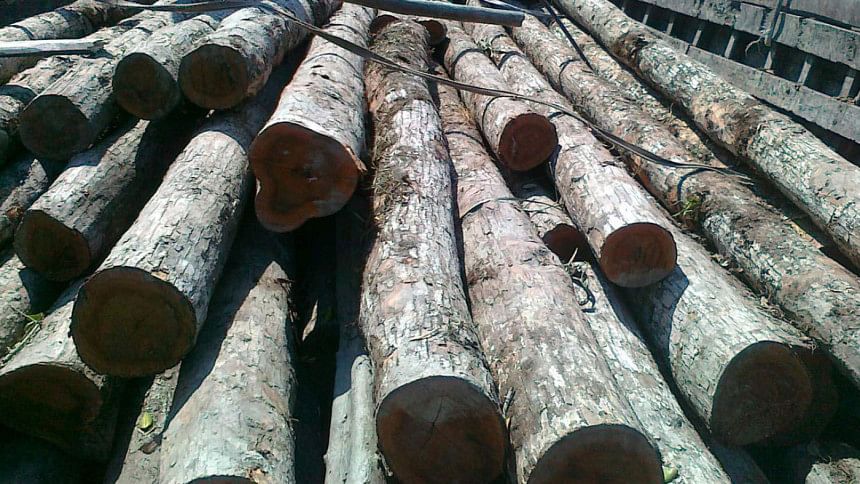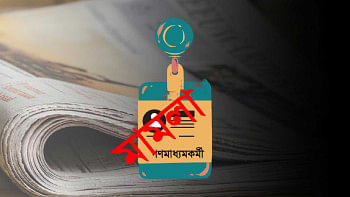Illegal trade in rare sundari trees continues unabated

Featuring the largest floating timber market in the country, Pirojpur's Nesarabad upazila, yet well-known by its former name of Swarupkathi, is an area synonymous with logs. For over a century this trade along the Sandha River has provided business opportunity and employment for thousands of people.
But Nesarabad's timber industry has a dark side. It includes prohibited trade in rare sundari trees, which only grow in the Sundarbans.
Before 1985 sundari logs were sold openly, but in that year, in response to declining numbers the species was protected, with the felling, sale and transportation of sundari logs banned. It's now 31 years later and their sale is yet to cease.
At the floating market each Monday and Thursday, the district's timber sellers and buyers from across the country converge along both the Sandha's riverbanks, busy in negotiation. Good river communication has been a blessing in maintaining Nesarabad's grip on timber. Trade seems above board. At the market, no sundari log can be found.
But sundari timber is available, sold secretly every day at different locations along the river's Indurhat side. Sources suggest over 150 locals are in some way involved.
Humayun Kabir, president of Indurhat's log business association, also admits to the clandestine trade's existence. "Around twelve men in the upazila conduct this business," he says. "It's less than it was."
According to locals, sundari logs are often carried by trawler or other country boat in order to avoid detection. "If sundari logs are carried by trawler," says one local trader who asked not to be named, "the boats move easily, unhindered."
Mostly the logs are transported and unloaded by night, with the precious cargo submerged and hidden in riverside drains and canals.
At the time of unloading each log is measured such that when customers arrive they are provided written measurements only, prior to purchase, with purchased logs reloaded onto boats, for onward transport, in the dead of night.
Kourikhara village to the north of Nesarabad is renowned for sundari smuggling. Locals suggest at least 15 locals are sundari traders.
"Smugglers use different techniques," explains one source, "Sometimes sundari logs are covered with coconut coir, sacks or other cargo to avoid detection."
With one cubic foot of sundari timber selling from Tk 400 to Tk 1500 according to size, there is money to be made. Sundari timber is also known for its longevity, another reason people buy it.
Informed sources implicate forest department officials, coast guard and law enforcement officers, in particular police, in facilitating the longstanding trade by taking bribes in order to turn a blind eye. In addition, some regional journalists are said to refuse to report on the issue.
In a rare case of action being taken, police on 26 January 2016 seized a boatload of sundari logs being transported to Indurhat. Police presented alleged smuggler Tarikul Islam to the media as owner of the seized logs.
But Kourikhara locals say there are many like Tarikul. They named Nazrul, Milon, Salam Reza, Kawsar, Jahid, Mukul, Sourob and Tonmoy as suspected sundari traders. Some are backed by ruling party men, locals advise.
About the involvement of forestry officials in facilitating the illicit trade, divisional forest officer of Sundarban East Division, Md Sydul Islam, could not give any clear answer. "If any forest official is found to be involved," he says, "I will take steps against them."
He also claimed that combating the trade is made difficult due to manpower and logistic support shortages. "We have about 3 officials where there should be up to 12 at a station," he says. "Some personnel are older and cannot move about easily."
"Another challenge," Islam continues, "is that smugglers will change location if we target one area." Nonetheless, he says he has a plan to conduct continuous operations in Nesarabad as well as in Rajoir upazila in Madaripur, another sundari selling hotspot.
However, one coast guard source advised The Daily Star that the forest department is unwilling to take their help in combating the smuggling. "Although there is formal agreement, in practice they never seek our help," says the official.
Captain Kazi Mehedi Masud, the zonal commander of the coast guard's west zone, agrees there is lack of cooperation with the forest department in checking sundari smuggling.
He also advises that no coast guard official is involved in helping sundari smugglers.
"Coast guard officers are not stationed in one place for long," he says, "It isn't possible for them to build relations with smugglers." He also says the Coast Guard takes firm action on any allegation of corruption.
It is to be hoped that future operations to combat sundari smuggling by forest department, coast guard and law enforcement personnel can be coordinated, thorough and effective: because, if the sale of rare sundari timber is indeed stopped, it will be for the first time.

 For all latest news, follow The Daily Star's Google News channel.
For all latest news, follow The Daily Star's Google News channel. 



Comments